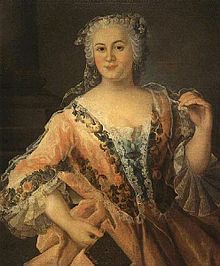Philippine Charlotte of Prussia
| Philippine Charlotte of Prussia | |||||
|---|---|---|---|---|---|
| Duchess consort of Brunswick-Wolfenbüttel | |||||
 |
|||||
| Born |
13 March 1716 Stadtschloss, Berlin |
||||
| Died | 17 February 1801 (aged 84) Brunswick |
||||
| Spouse | Charles I of Brunswick-Wolfenbüttel | ||||
| Issue |
Charles II, Duke of Brunswick-Wolfenbüttel Prince Georg Franz Sophie, Margravine of Brandenburg-Bayreuth Prince Christian Ludwig Anna, Duchess of Saxe-Weimar-Eisenach Prince Frederick Augustus Prince Albrecht Heinrich Princess Louise Prince Wilhelm Adolf Elisabeth Christine, Crown Princess of Prussia Princess Friederike Augusta Dorothea, Abbess of Gandersheim Prince Maximilian Julius Leopold |
||||
|
|||||
| House | Hohenzollern | ||||
| Father | Frederick William I of Prussia | ||||
| Mother | Sophia Dorothea of Hanover | ||||
| Full name | |
|---|---|
| Philippine Charlotte |
Princess Philippine Charlotte of Prussia (German: Philippine Charlotte von Preußen) (13 March 1716, in Berlin – 17 February 1801, in Brunswick) was a Duchess consort of Brunswick-Wolfenbüttel by marriage to Charles I of Brunswick-Wolfenbüttel and a known intellectual in contemporary Germany. She is listed as a female composer as she is thought to have written marches and other music.
Philippine Charlotte was the fourth child and third daughter of Frederick William I of Prussia and his spouse Sophia Dorothea of Hanover.
On 2 July 1733 in Berlin, Princess Philippine Charlotte married Duke Charles of Brunswick-Wolfenbüttel, eldest son of Ferdinand Albert II, Duke of Brunswick-Wolfenbüttel. Charles inherited the dukedom on his father's death in 1735, making her Duchess consort.
The double marriage alliance between Prussia and Brunswick by her marriage to Charles I, and that of her brother Frederick to Charles' sister Elisabeth Christine, led to a permanent alliance of the most important North German Protestant houses Prussia and Brunswick. The family ties of the two dynasties resulted the alliance of Brunswick and Prussia in the Seven Years' War, and the career of Philippines sons in the Prussian service.
Philippine Charlotte was described as subtle, highly educated and a child of the enlightenment. She worked independently of an extract of the philosophical writings of Christian von Wolff in French. The Duchess pursued, partly because of the influence of the ducal adviser Johann Friedrich Wilhelm Jerusalem, the German intellectual life very closely. She appreciated the poet Salomon Gessner and maintained a personal relationship . The dramatist Lessing were also among her circle.
...
Wikipedia
